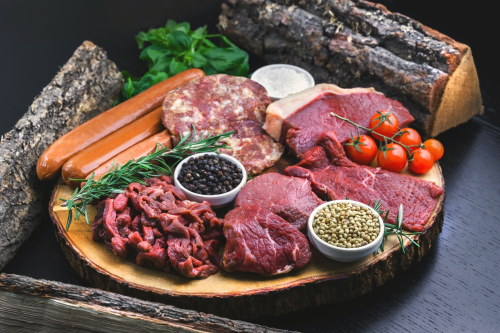Dietary fat tends to have a bad reputation. Despite what you may have heard, eating fat doesn’t make you fat — as long as you eat it in moderation. In fact, fat is an essential part of a balanced diet.
Your body needs dietary fat for many different biological processes. Not getting enough fat can make it harder for your body to function the way it should and can lead to health issues.
In this article, we’ll look at five signs that you may not be getting enough fat — in particular, the healthy kind — from the foods you eat. We’ll also explore the role fat plays in your body and how to go about creating a balanced diet.
BREAKING: Shed 42 lbs In 30 Days With This Simple Night-time Pill
Why do you need fat in your diet?
Your body needs dietary fat for many biological processes. You wouldn’t be able to live a healthy life without it. Here are some of the essential roles dietary fat plays in your body:
- Helps you absorb vitamins. Vitamins A, D, E, and K are fat-soluble, meaning your body can absorb them only when you consume them along with fat. A lack of fat in your diet can cause deficiencies in these vitamins, which can lead to a variety of health issues.
- Supports cell growth. Fat provides structure to the outer membrane of every cell in your body.
- Supports brain and eye health. The omega-3 fatty acids eicosapentaenoic acid (EPA) and docosahexaenoic acid (DHA) help maintain the health of your brain, central nervous system, and retinas. Your body doesn’t make these fatty acids — you can only get them from your diet.
- Wound healing. Essential fatty acids play a key role in wound healing and blood clotting.
- Hormone production. Your body needs dietary fat in order to make specific hormones, including the sex hormones testosterone and estrogen.
- Source of energy. Each gram of fat you consume provides you with about 9 calories of energy. For comparison, each gram of carbohydrate or protein yields only 4 calories of energy.
Types of dietary fat
Dietary fats can be divided into four categories: trans fats, saturated fats, monounsaturated fats, and polyunsaturated fats.
Trans fats
Trans fats, which are found primarily in partially hydrogenated oils, are the least healthy type of fat for your body. Hydrogenated oils are often used to improve the taste and shelf life of processed foods.
Your body doesn’t need trans fats. Eating a lot of this type of fat can raise your risk of heart disease, stroke, and type 2 diabetes.
Trans fats may be found in:
- processed foods (such as microwave popcorn, frozen pizzas, and crackers)
- baked goods (such as store-bought pie crusts, cakes, and cookies)
- fried foods (such as doughnuts and french fries)
- margarine and vegetable shortening
To find out if a food product contains trans fats, you can read the ingredient list on the package. If partially hydrogenated oil is listed as an ingredient, it’s best to avoid the product.
Saturated fats
Saturated fats are found mostly in animal products such as meat, eggs, and dairy products. These fats tend to be solid at room temperature.
The USDA recommends getting less than 10 percent of your daily calories from saturated fats. Current research suggests that replacing saturated fat with unsaturated fat is associated with a lower risk of heart disease.
Monounsaturated fats
According to the American Heart Association, monounsaturated fats can help reduce the LDL (“bad”) cholesterol in your blood. This can reduce your risk of heart disease and stroke.
Unlike saturated fats, monounsaturated fats are liquid at room temperature. Foods that are a good source of this type of fat include:
- plant-based oils (such as olive oil, canola oil, sesame oil, and safflower oil)
- nuts (such as almonds, peanuts, walnuts, and cashews)
- nut butters (such as peanut butter and almond butter)
- avocados
Polyunsaturated fats
Your body can’t make polyunsaturated fats — that’s why you need to get them from the food you eat. These fats are also known as “essential fats.”
Omega-3 fatty acids are a specific type of polyunsaturated fat that can help reduce your risk of heart disease, protect you against irregular heart rate, and help lower your blood pressure.
You can find omega-3 fatty acids in the following foods:
- fatty fish (such as salmon, mackerel, herring, and sardines)
- oysters
- flax seeds
- chia seeds
- walnuts
To help maintain good health, most of the fats you eat should be monounsaturated or polyunsaturated.
How to tell if you’re not getting enough fat in your diet
Dietary fat deficiency is rare in healthy people who eat a balanced, nutritious diet. However, some conditions can put you at risk for fat deficiency, such as:
- eating disorders
- large bowel resection (colectomy)
- inflammatory bowel disease
- cystic fibrosis
- pancreatic insufficiency
- an extremely low fat diet
If you’re not getting enough dietary fat, some biological processes in your body may not work as well.
Let’s take a closer look at some of the signs that you’re not getting enough fat in your diet.
Vitamin deficiencies
Your body needs dietary fat to help it absorb fat-soluble vitamins such as vitamins A, D, E, and K. Not getting enough of these essential nutrients can, among other things, increase your risk of:
- night blindness
- infertility
- swollen gums
- easy bruising
- dry hair
- loose teeth
- depression
- muscle pain
- blood clots under your nails
Dermatitis (skin inflammation)
Research has found that fat is an essential part of the structure of your skin cells and helps your skin maintain its moisture barrier. If you don’t get enough dietary fat, it could affect the health of your skin and lead to dermatitis.
“Dermatitis” is a general term to describe inflamed skin. Dermatitis caused by a dietary fat deficiency often presents itself as dry, scaly rashes.
Slow wound healing
According to research, your body needs fat to create many important molecules that control your body’s inflammatory response. Low dietary fat intake could disrupt this response and lead to slow wound healing.
Deficiencies in fat-soluble vitamins like vitamin A and vitamin D can also cause wounds to heal more slowly than they should.
Hair loss
Fatty molecules in your body called prostaglandins promote hair growth. Consuming too little essential fat could change your hair texture, and research suggests it could also increase the risk of hair loss on your scalp or eyebrows.
Frequent sickness
Severely restricting fat intake can weaken your immune system and lead to more frequent illnesses.
Your body needs dietary fat to produce several molecules that stimulate the activity of your immune cells.
Essential fatty acids are also important for the growth of immune cells. In particular, your body needs the omega-3 fatty acid alpha-linolenic acid and the omega-6 fatty acid linoleic acid for this purpose.
Tips for creating a more balanced diet
The USDA recommends getting up to 35 percent of your calories from fat. This means:
- up to 97 grams of fat per day in a 2,500-calorie diet
- up to 66 grams of fat per day in a 2,000-calorie diet
- around 50 grams of fat per day in a 1,500-calorie diet
But not all fats are created equal. It’s best to avoid eating foods that contain trans fats whenever possible.
It’s fine to include some saturated fats — such as eggs, meat, or dairy — in your diet. But try to get most of your fat intake from monounsaturated and polyunsaturated sources such as:
- olives and olive oil
- nuts and seeds
- fatty fish and fish oil
- avocado
TRENDING: This Keeps Your Blood Sugar Below 100 - Even When You're Eating Sweets!
The bottom line
Your body needs dietary fat for many biological processes. If you don’t get enough fat in your diet, you may notice symptoms such as dry rashes, hair loss, a weaker immune system, and issues related to vitamin deficiencies.
To help maintain good health, most of the fats you eat should be monounsaturated or polyunsaturated fats. These fats are typically found in fatty fish, nuts and seeds, olive oil, and avocados.









